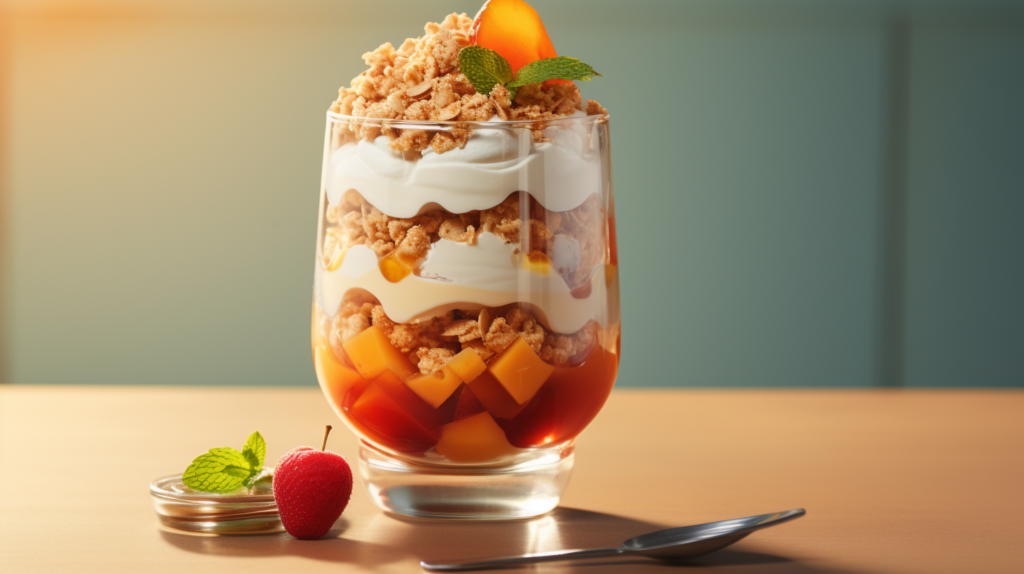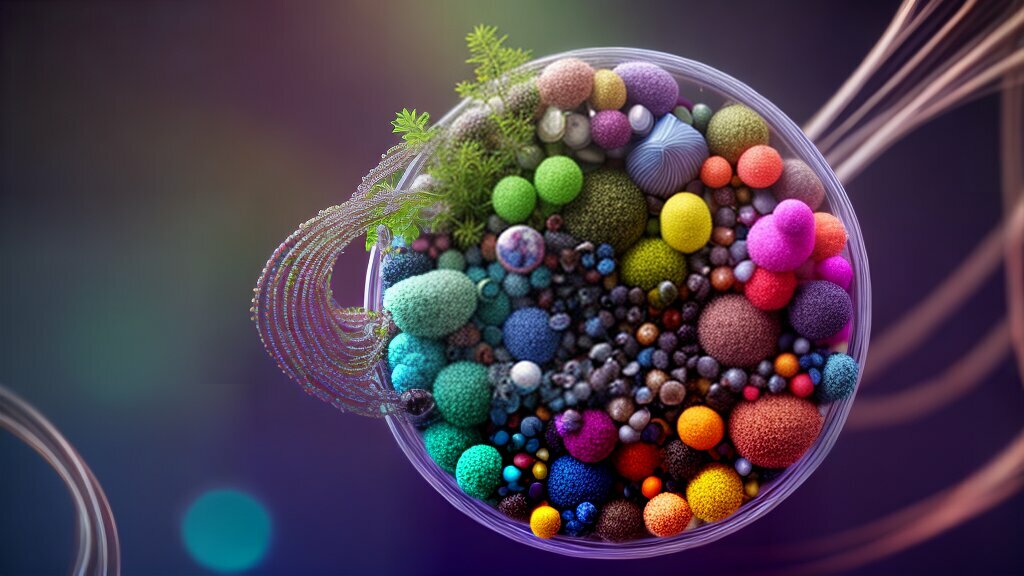If you’re one of the millions of people who take probiotics on a daily basis, you may wonder what happens when you stop. Probiotics are live microorganisms that promote gut health and support digestive function. They’re found in fermented foods like yogurt, kefir, and kimchi, as well as in dietary supplements.
Research has shown that probiotics offer a wide range of benefits, including improving immune function, reducing inflammation, and alleviating digestive issues. However, what happens when you stop taking them?
There are a few key effects to be aware of when you discontinue probiotic use. In this article, we’ll delve into the potential side effects of quitting probiotics, as well as strategies for restoring gut health and maintaining a healthy microbiome.
Principais conclusões:
- Probiotics are live microorganisms that promote gut health and support digestive function.
- Discontinuing probiotic use can lead to several potential side effects.
- Strategies for restoring gut health and maintaining a healthy microbiome include consuming prebiotics, monitoring your gut health, and seeking professional advice when needed.

Understanding Probiotics and Gut Health
If you’re considering stopping probiotics, it’s important to understand what they are and the role they play in gut health. Probiotics are live microorganisms that, when consumed in adequate amounts, confer health benefits to the host. They are commonly found in fermented foods like yogurt, kefir, and sauerkraut.
The human gut is home to trillions of microorganisms, including both beneficial and harmful bacteria. These microorganisms play a critical role in digestion, immune function, and overall well-being. Probiotics work by restoring and maintaining a healthy balance of bacteria in the gut, which can improve digestion and support immune function.
Fun Fact: Did you know that the gut houses 70% of the body’s immune system?
The Connection Between Probiotics and Gut Health
Probiotics have been shown to have a significant impact on gut health. Research suggests that they can:
- Reduce inflammation in the gut
- Improve the absorption of nutrients
- Enhance immune function
- Relieve symptoms of gastrointestinal disorders such as irritable bowel syndrome (IBS) and inflammatory bowel disease (IBD)
The benefits of probiotics are strain-specific, meaning that different types of bacteria have different effects on the body. Some strains have been shown to be particularly effective in improving certain health conditions, while others may not provide any noticeable benefits.
| Cepa probiótica | Benefício |
|---|---|
| Bifidobacterium lactis | Improves digestion and may reduce the risk of respiratory infections |
| Lactobacillus acidophilus | May reduce symptoms of irritable bowel syndrome (IBS) |
| Lactobacillus rhamnosus GG | May reduce the risk of gastrointestinal infections in children |

Benefits of Taking Probiotics
If you’re looking to support your gut health, taking probiotics can be a great option. Probiotics are live microorganisms that provide a range of health benefits when consumed in adequate amounts.
Some of the key benefits of taking probiotics include:
- Improved digestion: Probiotics can help ease digestive discomfort and improve overall gut health. They may be particularly helpful for those with irritable bowel syndrome (IBS), inflammatory bowel disease (IBD), or other digestive issues.
- Enhanced immune function: Research suggests that probiotics can help boost immunity and reduce the risk of infections.
- Relief from gastrointestinal issues: Probiotics may help alleviate symptoms of certain gastrointestinal conditions, including diarrhea, constipation, and bloating.
It’s important to note that not all probiotics are created equal. Different strains of probiotics may provide different benefits, and some may be more effective than others for certain conditions.
When choosing a probiotic supplement, look for one that contains strains that have been shown to be effective for your specific needs. For example, Lactobacillus acidophilus has been studied for its potential to alleviate symptoms of IBS, while Bifidobacterium lactis may be helpful for those with lactose intolerance.
In addition to supplements, you can also consume probiotics through certain foods, such as yogurt, kefir, sauerkraut, and kimchi. These foods contain natural sources of probiotics and can be a great addition to a healthy, balanced diet.
Remember that while probiotics can be beneficial for your gut health, they are not a replacement for a healthy diet and lifestyle. Aim to consume a variety of nutrient-dense foods, exercise regularly, and manage stress to support overall well-being.
Dependence on Probiotics
There are concerns that long-term use of probiotics may lead to dependence on them. Some people worry that their gut microbiome will no longer be able to function properly without probiotic supplements.
While there is some evidence to suggest that this could be a possibility, it is important to note that research on this topic is limited, and the long-term effects of probiotic use are not yet fully understood.
It is important to strike a balance between taking probiotics for their potential health benefits and allowing your body to maintain a healthy gut microbiome on its own.
In fact, some experts recommend taking breaks from probiotics to allow your gut microbiota to reestablish itself and maintain its diversity.
In general, it is best to use probiotics as part of a broader approach to gut health, including a healthy diet, exercise, stress management, and regular check-ups with your healthcare provider.
Consulting your healthcare provider about probiotic use and monitoring your response to probiotics over time can help you make informed decisions about how to best support your gut health.

Side Effects of Quitting Probiotics
Stopping probiotics may lead to various side effects, especially if you have been using them for a long time. The sudden absence of these beneficial bacteria may cause an imbalance in your gut microbiome, leading to digestive discomfort and other related symptoms.
The most common side effects of quitting probiotics include:
| Efeitos colaterais | Descrição |
|---|---|
| Inchaço | You may experience bloating due to the production of excess gas in your gut, leading to abdominal distension and discomfort. |
| Changes in Bowel Movements | You may notice changes in your bowel movements, such as constipation or diarrhea, as your gut microbiome adjusts to the absence of probiotics. |
| Increased Susceptibility to Infections | Your immune system may become weaker, making you more susceptible to infections and illnesses. |
| Other Digestive Symptoms | You may experience other digestive symptoms, such as abdominal pain, cramping, and flatulence. |
If you experience any of these symptoms after stopping probiotics, try not to panic. It is normal for your body to take time to adjust to changes in your gut microbiome. However, if these symptoms persist or worsen, it’s crucial to seek medical advice.
Restoring Gut Health After Stopping Probiotics
Discontinuing probiotics can have a significant impact on your gut health, but there are ways to restore and maintain a healthy microbiome naturally. Here are some tips to help you rebuild your gut health:
- Consume fermented foods: Fermented foods such as kimchi, kefir, and sauerkraut contain beneficial bacteria that can help restore your gut health. Make sure to incorporate these foods into your diet.
- Aumente a ingestão de fibras: Fiber-rich foods such as fruits, vegetables, and whole grains can help nourish the beneficial bacteria in your gut and promote their growth.
- Maintain a balanced diet: Eating a balanced diet with a variety of nutrients is essential for overall health, including gut health.
- Considere os prebióticos: Prebiotics are indigestible fibers that serve as food for the beneficial bacteria in your gut. Foods such as garlic, onions, and bananas are rich in prebiotics and can help promote the growth of beneficial bacteria.
- Mantenha-se hidratado: Drinking plenty of water and staying hydrated can help support overall digestive health.
It’s important to note that restoring gut health after stopping probiotics can take time, and it may require some trial and error to find what works best for you. Be patient and consistent with your efforts, and consider working with a healthcare professional if you’re struggling.

Monitoring Your Gut Health
After discontinuing probiotics, it is crucial to monitor your gut health regularly to ensure it stays balanced and healthy. Some signs to watch out for include changes in bowel movements, abdominal discomfort, and bloating.
One way to assess your gut health is to keep a food diary to track your diet and any digestive symptoms experienced. Additionally, a stool analysis can provide valuable insights into the status of your gut microbiome.
If you experience any persistent or severe digestive issues, it is essential to seek professional advice. A healthcare professional can conduct tests, provide personalized guidance and recommend supplements or dietary changes to restore gut health.
Overall, paying attention to your gut health can help prevent potential health problems and improve your overall well-being.
Lifestyle Factors for a Healthy Gut
When it comes to maintaining a healthy gut, lifestyle factors play a crucial role. Incorporating these habits into your daily routine can support your gut health and reduce the chances of adverse effects after stopping probiotics.
- Eating a balanced diet: Consuming a variety of whole, unprocessed foods provides your gut with the nutrients it needs to function optimally. Aim for a diverse range of fruits, vegetables, whole grains, and lean protein sources.
- Stress management: Chronic stress negatively impacts gut health by increasing inflammation and disrupting the balance of gut bacteria. Practice stress-reducing techniques such as meditation, yoga, or breathing exercises.
- Regular exercise: Exercise supports gut health by improving blood flow and reducing inflammation throughout the body. Aim for at least 30 minutes of moderate activity per day.
- Adequate sleep: Getting enough quality sleep is essential for overall health, including gut health. Aim for 7-9 hours of sleep per night to support your gut microbiome.
By incorporating these lifestyle factors into your routine, you can help maintain a healthy gut without relying solely on probiotic supplements.

Importance of Prebiotics
While probiotics are often praised for their role in gut health, prebiotics are equally important. Prebiotics are a type of fiber that feed the good bacteria in your gut, allowing them to thrive and support digestive health.
Incorporating prebiotic-rich foods into your diet can help restore gut health after discontinuing probiotics. Some examples of prebiotic foods include:
- Alho
- Cebolas
- Aspargos
- Bananas
- Oats
- Maçãs
These foods not only provide prebiotics but also offer a range of other health benefits, making them a valuable addition to any diet.
It’s important to note that prebiotics should not be relied on as a replacement for probiotics, but rather as a complementary addition to support gut health.

By incorporating prebiotic-rich foods into your diet, you can support the growth of beneficial gut bacteria and maintain a healthy gut microbiome.
Buscando aconselhamento profissional
It is important to consult a healthcare professional before discontinuing probiotics. They can provide personalized guidance and recommendations based on your individual needs. Your doctor can help you determine if you need to continue taking probiotics or if there are alternative options that can help you maintain a healthy gut microbiome.
If you experience any adverse reactions after stopping probiotics, it is essential to seek medical attention promptly. Your doctor can assess your gut health and recommend appropriate treatments to alleviate any discomfort or symptoms you may be experiencing.
Remember, your doctor is your ally in maintaining optimal health, and seeking their advice is one of the best things you can do for your well-being.
Long-Term Strategies for Gut Health
If you are considering discontinuing probiotic use, it is crucial to adopt long-term strategies for maintaining a healthy gut microbiome. While probiotics can play a beneficial role in supporting gut health, they should not be the sole focus of your efforts.
One of the most critical aspects of long-term gut health is maintaining a diverse and balanced diet. A diet rich in fruits, vegetables, whole grains, and lean proteins provides essential nutrients and fiber to support beneficial gut bacteria.
Stress reduction techniques, such as meditation or regular exercise, can also play a key role in supporting gut health. Chronic stress can disrupt gut microbiota and cause digestive issues.
Regular check-ups with a healthcare professional can help identify potential gut health concerns and provide personalized recommendations for maintaining optimal gut health.
Remember to prioritize your gut health by adopting healthy lifestyle habits and seeking professional advice when needed. By doing so, you can support your gut microbiome and enjoy optimal digestive function and overall well-being.

Common Misconceptions About Probiotics
There are several misconceptions about probiotics that can impact our understanding of their benefits and consequences:
- Probiotics are a cure-all solution for gut health: While probiotics can support gut health, they may not be suitable for everyone. It’s important to consult with a healthcare professional before starting or stopping probiotics.
- You can’t rebuild gut health without probiotics: While probiotics can help improve gut health, there are several natural ways to support a healthy gut microbiome. Consuming fermented foods and increasing fiber intake are just a few examples of prebiotic-rich foods that can help nourish beneficial gut bacteria.
- You can never stop taking probiotics: Prolonged use of probiotics may lead to reliance on them. It’s important to achieve a balanced gut microbiome and not solely rely on supplements for gut health.
- You can’t experience negative effects from quitting probiotics: Quitting probiotics can cause adverse reactions, such as changes in bowel movements and digestive discomfort. It’s important to monitor gut health and seek professional advice if necessary.
By understanding these common misconceptions, you can make informed decisions about your gut health and take the necessary steps to maintain a balanced gut microbiome.

The Impact of Stopping Probiotics and Maintaining Gut Health
Now that you understand the effects of stopping probiotics, it’s important to prioritize your gut health. Maintaining a healthy gut microbiome is crucial for overall well-being and can help prevent various health issues. Remember, it’s not just about taking probiotic supplements, but also adopting healthy lifestyle habits.
Continue to monitor your gut health regularly and seek professional advice when needed. Implement long-term strategies, such as diversifying your diet with prebiotic-rich foods, managing stress, sleeping well, and exercising regularly. These practices can help support a healthy gut microbiome and promote overall health.
Don’t fall for common misconceptions about probiotics and their discontinuation. Stay informed and empowered to make the best decisions for your gut health. Remember, your gut is a complex ecosystem that requires balance and care. By maintaining a healthy gut microbiome, you can support your overall health and well-being.
PERGUNTAS FREQUENTES
Q: What happens when you stop taking probiotics?
A: When you stop taking probiotics, there can be several key effects on your body. These can include changes in digestion, immune function, and gut health. It is important to understand these effects and take steps to maintain a healthy gut microbiome.
Q: What are probiotics and their role in gut health?
A: Probiotics are live bacteria and yeasts that are beneficial for your health, especially your digestive system. They contribute to a healthy gut by promoting a balanced gut microbiota, aiding digestion, and supporting overall well-being.
Q: What are the benefits of taking probiotics?
A: Taking probiotics can have several positive effects on your health. They can improve digestion, enhance immune function, alleviate gastrointestinal issues, and provide targeted benefits based on specific probiotic strains.
Q: Is there dependence on probiotics?
A: There is a concept of reliance on probiotics, where long-term use may lead to the body becoming dependent on them. However, achieving a balanced gut microbiome through a varied diet and lifestyle factors is crucial for overall gut health.
Q: What are the side effects of quitting probiotics?
A: Quitting probiotics can result in side effects such as changes in bowel movements, bloating, and digestive discomfort. These symptoms may arise due to the absence of the beneficial bacteria provided by probiotics.
Q: How can I restore gut health after stopping probiotics?
A: After discontinuing probiotics, you can restore gut health by incorporating natural strategies. These include consuming fermented foods, increasing fiber intake, and maintaining a balanced diet that promotes the growth of beneficial gut bacteria.
Q: Why is monitoring gut health important?
A: Regularly monitoring gut health, especially after stopping probiotics, is crucial for maintaining overall well-being. Observing digestive symptoms and seeking professional advice when necessary can help identify any imbalances and take appropriate actions.
Q: What lifestyle factors contribute to a healthy gut?
A: Several lifestyle factors contribute to a healthy gut, including stress management, regular exercise, and adequate sleep. These habits positively impact gut health and support overall well-being.
Q: What is the importance of prebiotics for gut health?
A: Prebiotics play a crucial role in supporting gut health, especially after discontinuing probiotics. These non-digestible fibers nourish and promote the growth of beneficial gut bacteria, helping maintain a balanced gut microbiome.
Q: Should I seek professional advice before discontinuing probiotics?
A: It is important to seek professional advice when considering discontinuing probiotics. Healthcare professionals can provide personalized guidance and recommendations based on your individual needs and ensure a smooth transition.
Q: What are the long-term strategies for maintaining gut health without probiotics?
A: Maintaining a healthy gut microbiome without relying solely on probiotics requires long-term strategies. These include diversifying your diet, reducing stress, and regularly checking your gut health with professional guidance.
Q: What are common misconceptions about probiotics?
A: There are several common misconceptions about probiotics. This section will debunk these myths and provide accurate information to ensure readers have a clear understanding of probiotic usage and discontinuation.
The impact of stopping probiotics and maintaining gut health
This concluding section summarizes the key effects of discontinuing probiotics and emphasizes the importance of maintaining gut health. It highlights the significance of a balanced gut microbiome, healthy lifestyle habits, and seeking professional advice when needed.














